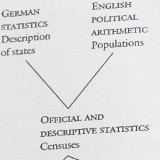Doctoral Research
Below is a short summary of my doctoral work. The full doctoral exposé has a much fuller referenced discussion of the literature and methods. A small selection of texts that give a flavour of the focus of the dissertation appear below. Also in German: Zusammenfassung auf Deutsch
States and the production of Public Statistics
Since the birth of sociology the analysis of quantitative data has been one characteristic part of the discipline’s method. More recently, statistical practices have themselves been taken as objects of sociological enquiry. A pre-eminent reason for this is that states produce, procure, consume and represent statistical data in the pursuit of policy and politics. Statistical practices have been, with increasing intensity and sophistication, integral to state power and state policy from the early modern period onwards. What began with the counting of people and of flows of goods now encompasses complex measurement of the population’s health, welfare and beliefs and movements of capital. Propositions derived from such public statistics are central to the formulation of policy across every field of late-modern state activity.
Sociology and Statistics
Beyond this public statistics are sociologically important in that they have a dual aspect: as a tool of statecraft, adapted to circumstance and contingency, but also as scientific practice. The production of statistical data and the operations performed upon them are also governed by scientific principles that assert their universality, and their autonomy from any passing political imperative. Statistics is a science in its own right, and scientists from other disciplines are engaged with and in the state’s use of statistics. Hence not only the mathematical methods of public statistics but also the schemata, classifications, interpretations and representations of public statistics belong in part to the field of science.
The concerns of governments are historical and local, as are the precise terms of engagement between state bodies and scientific researchers in the generation of public statistics. A comparative study of the state’s production and procuring of statistics from 1975 to 2010 in two European countries, Great Britain and Germany, is here proposed. As a case study, the research takes public statistics which relate to poverty and the distribution of income among private individuals and households in the two countries. The research thus addresses the same domain of policy and the same historical period in two countries which have much in common, but have also marked and interesting differences in political history, social forms and intellectual traditions. There is a developed literature on statistics in the history of science, but there are few sociological studies of public statistical practices and institutions in late modern states, and very few or none that have taken a cross-country comparative approach.
Indicative Texts
Some readings that have influenced the development of my doctoral work:
Zwischen Wissenschaft Und Staat? Die Verortung Der Ressortforschung
Barlösius, E (2008). Wissenschaftszentrum Berlin für Sozialforschung (WZB) Discussion Papers. download
Science of Science and Reflexivity
Bourdieu, P (2004). Trans R Nice. Cambridge: Polity.
The Sociology of Statistics: The Possibilities of a New Field of Investigation
Camargo, A (2009). História, Ciências, Saúde-Manguinhos 16 (4): 903–925. download
The Politics of Large Numbers: a History of Statistical Reasoning
Desrosières, A (1998). Translated by Camille Naish. Cambridge: Harvard University Press.
Security, Territory, Population: Lectures at the Collège De France, 1977-78
Foucault, M (2007). Ed. M. Senellart, Trans. G. Burchell. Basingstoke: Palgrave Macmillan.
Amtliche Statistik, Sichtbarkeit Und Die Herstellung von Verfügbarkeit
Köhler, B (2008). Berliner Journal Für Soziologie 18 (1): 73–98. doi:10.1007/s11609-008-0005-8.
Governing Education through Data in England: From Regulation to Self-evaluation
Ozga, J (2009). Journal of Education Policy 24 (2): 149. doi:10.1080/02680930902733121.
